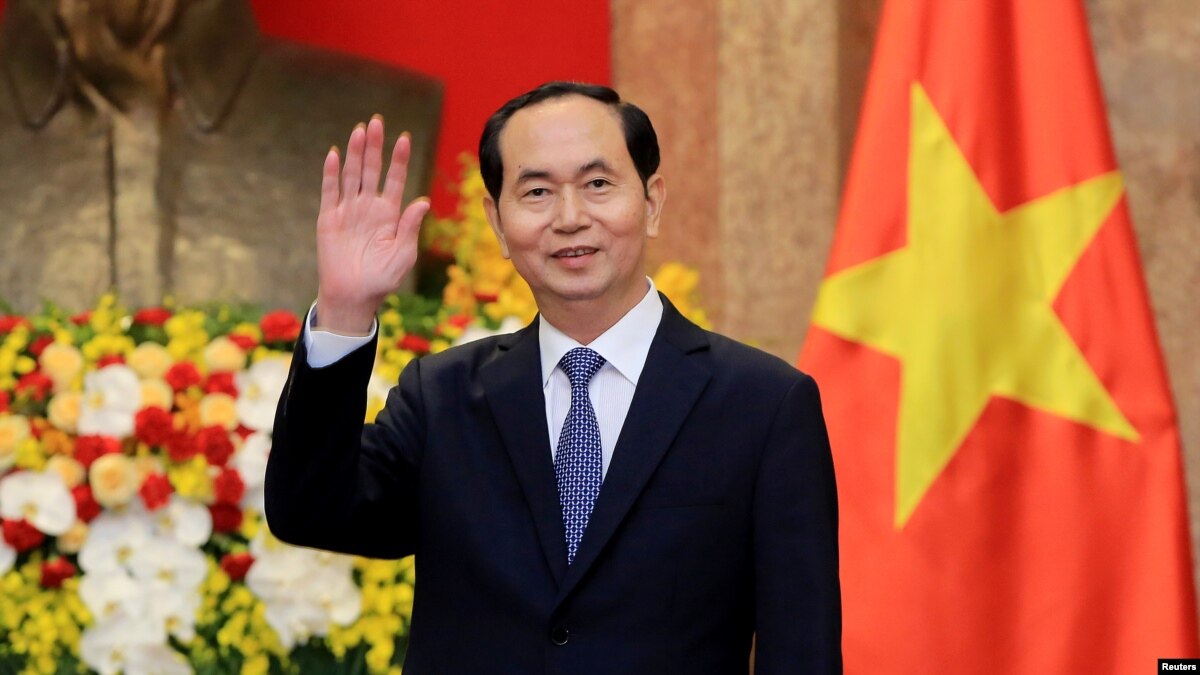
The Vietnamese president who died this month will be remembered for heading a tough public security ministry but otherwise as a low-key functionary who followed the will of a more powerful Communist Party general-secretary in stopping dissent, graft and any barriers to economic development.
President Tran Dai Quang died Friday at age 61 after fighting an illness for several months, scholars and state-backed Vietnamese media say. He was half way through a five-year term.
Quang will be remembered for his police background, staunch support for Communist Party General-Secretary Nguyen Phu Trong and ceremonial appearances with foreign heads of state, people who follow Vietnamese politics say. Those roles meant endorsing a crackdown against political dissent, busting graft in state-run companies and stumping for stronger trade deals with major countries.
“The office of state president is largely symbolic and carries little substantive power in Vietnam's political system,” said Carl Thayer, emeritus professor with the University of New South Wales in Australia. “Quang was the quintessential ‘grey man’ who blended into the background of Vietnam's collective leadership. There will be no major change in Vietnam's economic strategy or political system as a result of [his] passing.”
Frowned on dissent, corruption
Quang was educated in Vietnam and came from a military background that won him two major awards.
He worked from 2011 to 2016 as public security minister and oversaw a phase of Vietnam’s dissent crackdown that targeted online commentators. In 2016, for example, a blogger nicknamed Mother Mushroom was arrested on suspicion of propagandizing against the state. She received a 10-year prison sentence last year.
“Quang will probably be best remembered for running the Ministry of Public Security, which in recent years has come down quite hard on democracy activists, bloggers and human rights lawyers, who the government fears are trying to overthrow the Communist regime,” said Murray Hiebert, deputy director of the Southeast Asia Program at the Center for Strategic and International Studies in Washington.
“Quang’s protégés and allies in the Ministry of Public Security can be expected to keep a tight lid on protests and clamoring for more democracy,” Hiebert said.
Quang was at least an informal backer of a party-driven anti-graft crackdown that became visible last year with the arrests of state-owned company executives. Common Vietnamese were growing angry then about corruption.
In the best-known recent anti-graft case, the former chairman of state-owned gas and oil firm PetroVietnam was sentenced to death, and an official from Vietnam-based OceanBank received life in prison over a multi-million-dollar graft case. In January, 22 other officials from PetroVietnam and its affiliates went on trial.
Toughness aside, many in Vietnam will remember Quang for “empathy to anti-China protests” in June, Thayer said. Protesters gathered in pockets around Vietnam to oppose a draft law that could let Chinese investors sign 99-year leases in three proposed special economic zones. The National Assembly delayed the issue until 2019.
Ceremonial role for foreign trade and investment
As president, Quang appeared in public largely to meet foreign heads of state, including Chinese President Xi Jinping and U.S. President Donald Trump.
Quang used those meetings to stimulate trade, the lifeblood for Vietnam’s economy as it depends largely on export manufacturing. Exports have led economic growth of around 6 percent per year since 2012.
Vietnam hopes to cement an 11-member Trans Pacific Partnership, even without the United States after it withdrew last year, and finalize a free trade deal with the European Union. Vietnam counts the United States as its top single-country export destination and shipped $46.5 billion worth of goods there last year.
Quang had taken a low-key role in decision making over the past half year as he sought medical treatment in Japan, said Trung Nguyen, director of the Center for International Studies at Ho Chi Minh University of Social Sciences and Humanities.
Still, the position of president called on Quang to get involved in a bit of everything. “I would assume that he would be involved in all aspects of government policy in some way,” said Kevin Snowball, chief executive officer with PXP Vietnam Asset Management in Ho Chi Minh City.
Smooth transition
Quang’s worked at times to balance his own power against that of the prime minister, some analysts say. The president is head of state and runs the military. The prime minister is the executive over other government departments.
“In Vietnam’s political system, the president doesn’t have a lot of power, but [Quang] knows how to share the power between the prime minister and the president,” Nguyen said.
Vice President Dang Thi Ngoc Thinh has already taken over as acting president until the National Assembly officially picks a new one. Several people, including the party chief’s “right-hand man,” have surfaced as possible long-term successors, Nguyen said.
Read More Quang Remembered as Low-key Functionary, Close to Country’s Police Organs : https://ift.tt/2OO90GI
No comments:
Post a Comment